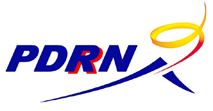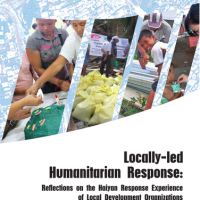Capability-building Support to CBPOs, LGUs, NGOs, Government Agencies
Trainings and Workshops
| Title | Description |
|
Community-Based Disaster Risk Reduction and Management Training with reference from the CBDRRM Basic Instructors’ Guide (BIG) of the OCD-JICA joint project |
CBDRRM approach is composed of activities, measures projects and programs to reduce disaster risks and are primarily design by and for people living in high-risk communities and are based on their urgent needs and capacities. It corrects the top-down approach; whereby there is a meeting of the bottom-up (community or local level) and top-down (national or higher level) approaches for the integrated and responsive disaster management system. CBDRRM is a process of disaster risk reduction and management in which at risk communities are actively engaged in the identification, analysis, treatment, monitoring and evaluation of disaster risks in order to reduce their vulnerabilities and enhance their capacities, and where the people are at the heart of decision-making and implementation of disaster risk reduction and management activities (as stated in RA 10121). Both the 2011-2028 NDRRMP and 2011-2028 NCCAP, as well as related memorandum circulars from national government agencies, reiterate and emphasize the key roles of local government units (LGUs) and provide reference to (CBDRRM) activities. The training generally aims enhance capacities of participants in DRRM and appreciate community-based approach as viable tool to face, cope up, and recover from hazards / disasters. |
| Training of Facilitators on Community Risk Assessment through Participatory Capacity and Vulnerability Analysis (PCVA) |
Risk Assessment is a methodology to determine the nature and extent of risk. The training is focused on assessing disaster risk and climate change exposure using PCVA, a research methodology both as an analysis and planning tool that uses PLA (Participatory Learning and Action) principles and analytical framework such as Pressure and Release Model. The PCVA allows the researcher / practitioners to a) understand existing capacity and vulnerability of communities; b) identify sensitive long and short-term needs of communities; and c) identify possible options to address the needs and aid communities in formulating program design. The training aims to develop / increase knowledge and facilitation skills on participatory risk analysis and accessing the vulnerabilities and capacities of disaster-prone areas. Further, it provides venue to acquire appropriate behavior and attitude to facilitate PCVA. In the main, concrete output of the training is an instrument or PCVA design in data gathering at the community level. The instrument is focus on acquiring information based on the experiences, perception and opinion of people related to climate change, various hazards, decision making processes, and the participation of various stakeholders to address emergencies and disaster risk reduction activities vis-à-vis development issues, needs and recommendations. |
| Training of Facilitators on Contingency Planning |
Contingency Planning is a forward planning process in a state of uncertainty in which scenarios and objectives are agreed, managerial and technical actions defined, potential response systems put in place in order to prevent, or better respond to, an emergency or critical situation as defined by the UNHCR. The Philippines, through the OCD has developed a manual for LGUs entitled, “Contingency Planning for Emergencies”, latest version is the 2007 edition. Generally, the training aims to develop a pool of trainer-facilitators with basic competencies to facilitate the formulation of Contingency Plans towards building safe and disaster resilient communities. Specifically, the participants, at the end of the training are expected to a) articulate the DRR concepts, local hazards and rights-based approach as framework for response; b) discuss and demonstrate the process of drafting contingency plans; c) demonstrate teaching skills on specific topics at the local level; and d) develop a common CP design for communities and LGUs. |
| Contingency Planning- Formulation Workshop |
The workshop aims to formulate a Contingency Plan focus on the major hazard of the community, municipality or province towards efficient and effective emergency response. The whole process allows the members of the group of LDRRM Council with common understanding of the risk situation thus formulation of appropriate policies and concrete actions during emergencies. Moreover, it generates commitments and coordinated actions among member agencies and other significant stakeholders as well as determines critical next steps to operationalize the plan at least for the next six (6) months. As guide, the workshop utilizes the Contingency Planning for Emergency Manual of the OCD but ensures simplified process especially for community and organized groups as well as for schools. The workshop design ensures to address the common issues in emergencies – time constraints, enormous needs, and complex coordination. |
| Evacuation and Evacuation Center Management Training-Workshop |
The Training-Workshop is part of preparedness for an effective emergency response. Evacuation Center Management or Camp Coordination and Camp Management (CCCM) is one of the major interventions during emergencies or the whole Emergency Response (ER). As defined, emergency responses are measures taken immediately prior to and following disaster impact, which measures are directed towards saving life and protecting property and dealing with the immediate damage caused by the disaster. The objective of the training-workshop is to enhance the capacity of the LDRRMCs to manage evacuation and camps / evacuation centers prior, actual and post emergencies. Specifically, it will provide venue for camp managers, members, and other key actors to level off and complement efforts to an organized evacuation and decampment. |
| Municipal Comprehensive Development Planning-Workshop / Strategic Planning Workshop |
The planning-workshop aims to formulate a 5-6 year plan that addresses strategic needs of vulnerable population and groups, identify priority sectoral developmental programs framed towards building safe and resilient communities. The Rationalizing the Local Planning System (RPS), a tool of the DILG to put order in the planning system in the Philippines as there are more or less 27 plans that should be prepared by the LGUs. The RPS provides for integration of sectoral and topical plans required by the national agencies to the LGUs to the requirements of the CLUP and CDP and allows the local governance structure to mainstream their plans in one process. The design of the workshop ensures DRR-CCA concerns are integrated that rapid risk assessment and capacity needs assessment are conducted as part of the preparation. The results provide risk situation to unify the LDC towards identification of strategic issues and critical gaps towards formulation of risk responsive and gender sensitive plan within the development framework. |
| School-based Disaster Risk Reduction and Management Training of Facilitators |
Working with the public school system is an important strategy in building resilience in governance. Schools are critical venues for raising public awareness and building the culture of safety. Teachers are instrumental in disseminating messages on DRR and CCA and can prepare school children to better cope with emergencies. Since most of public schools are utilize as evacuation centers during emergencies, it plays significant role as institution for learning and venue for protecting the rights and dignity of disaster affected population. The School Based Disaster Risk Reduction and Management (SBDRRM) is framed to ensure protection of children specifically in times of emergencies and contribute in building disaster resilient schools and communities. It is therefore necessary that teachers must be equipped with knowledge and skills to increase the school’s capacity in disaster risk reduction. The 3-day training aims to develop a pool of trainer-facilitators with basic competencies to facilitate school level Contingency Planning Workshops geared towards institutionalizing SBDRRM to build safe schools in CARAGA. Specifically, the participants are able to:
|

